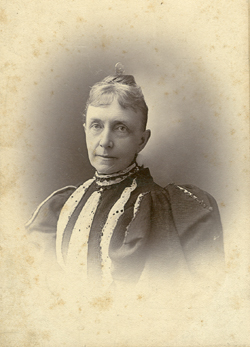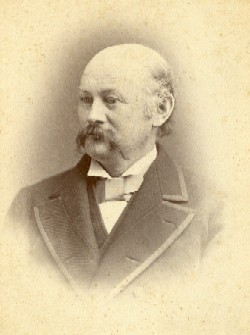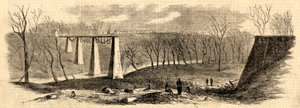Fayette Van Alstine Letters, 1861-1879
By Elizabeth Kissack
Special Collections Assistant
About |
 Fayette Van Alstine was born in New York ca. 1833 and worked as an L&N Railroad freight agent in Louisville during the 1860s and 1870s. A collection of his Civil War-era letters is housed in The Filson’s Special Collections and provides a valuable glimpse into Louisville’s wartime history.
Fayette Van Alstine was born in New York ca. 1833 and worked as an L&N Railroad freight agent in Louisville during the 1860s and 1870s. A collection of his Civil War-era letters is housed in The Filson’s Special Collections and provides a valuable glimpse into Louisville’s wartime history.
Van Alstine’s letters address the strategic importance of the railroad to the war effort, the threats to the city posed by John Hunt Morgan and Braxton Bragg, and the general mood of the city’s residents. The letters also document a tender long-distance love story, Van Alstine’s romance with Maria Ann Whiting of New Hampshire. These two themes – love and the war – are intertwined; the chaos and uncertainty of the times heightened the already tumultuous emotions of romance, and the promise of future marital bliss and peace made the dark moments of the war seem that much bleaker.
The earliest letters in the collection date from 1861. At that time, Van Alstine had already begun his epistolary courtship of Whiting, though the early letters are more formal and cautious. By August of 1862, however, he was closing his letters with phrases like “Yours entirely” and “I am yours,” and he always signed them “Van.” The couple married one year later, in August 1863. In the meantime, his letters to “Marie” overflowed with his love for her and his optimism about their future. In one letter he wrote, “I would exchange my happiness and hopes with no one in the earth. I envy not grandeur its wealth nor honor its fame. You My M constitute all – I ask no more.”
 Despite his optimism, Van
Alstine sometimes worried that the ongoing war would affect their future together.
He mused, “Do you ever think my M of how many obstacles may intervene
especially in these times. War and famine and sickness even death are more probable than in ordinary
times . . . business may stop and bankruptcy be impending over all.”
Van Alstine had a playful sense of humor that came through in his letters.
In August 1862 as John Hunt Morgan threatened Louisville he teasingly
invited her to take up arms and defend the Union: “Danger lurks everywhere,
but we loyal people of Louisville have a body guard of 125,000 able bodied
men armed and equipped and we invite all able bodied women between 16 &
30 to share the glory. Will you come? Won’t you come? We would take you notwithstanding physical defects.”
Despite his optimism, Van
Alstine sometimes worried that the ongoing war would affect their future together.
He mused, “Do you ever think my M of how many obstacles may intervene
especially in these times. War and famine and sickness even death are more probable than in ordinary
times . . . business may stop and bankruptcy be impending over all.”
Van Alstine had a playful sense of humor that came through in his letters.
In August 1862 as John Hunt Morgan threatened Louisville he teasingly
invited her to take up arms and defend the Union: “Danger lurks everywhere,
but we loyal people of Louisville have a body guard of 125,000 able bodied
men armed and equipped and we invite all able bodied women between 16 &
30 to share the glory. Will you come? Won’t you come? We would take you notwithstanding physical defects.”
Attempts by Van Alstine to get a commission in the Union army failed, but despite this disappointment he still took pride in the work he did as a railroad agent. In June 1863 he wrote, “I desire to work as long as I live. It is true glory to help the weak against the strong to protect the right against the wrong and there are not many days that I do not enjoy this privilege.”
As a railroad employee, Van Alstine’s awareness of troop movements
was unusual for a civilian; in July  1863 he speculated, “Probably I
am as well posted (from extra facilities) about rebel movements as any
one in Louisville.” In addition to commenting on the activities and
location of John Hunt Morgan’s forces and Buell’s Army of the Ohio, he
often discussed railroad issues, such as whether or not the trains
were running,
how many miles were open, which bridges were destroyed or in danger, and what was
being transported.
1863 he speculated, “Probably I
am as well posted (from extra facilities) about rebel movements as any
one in Louisville.” In addition to commenting on the activities and
location of John Hunt Morgan’s forces and Buell’s Army of the Ohio, he
often discussed railroad issues, such as whether or not the trains
were running,
how many miles were open, which bridges were destroyed or in danger, and what was
being transported.
 The safety of the city was a frequent
theme in his letters. Van Alstine often reported the mood in Louisville,
whether one of fear (“the ladies will not sleep much tonight”) or resignation
(“People of this city are past being frightened. They have settled
themselves into a stolid indifference”). Van Alstine’s own mood towards the
war and its outcome changed as the war unfolded, from “the Union army
must and will eventually conquer” to “things look dark.” In June 1863 he
wrote, “Is not the hope of restoration fading every day?”
The safety of the city was a frequent
theme in his letters. Van Alstine often reported the mood in Louisville,
whether one of fear (“the ladies will not sleep much tonight”) or resignation
(“People of this city are past being frightened. They have settled
themselves into a stolid indifference”). Van Alstine’s own mood towards the
war and its outcome changed as the war unfolded, from “the Union army
must and will eventually conquer” to “things look dark.” In June 1863 he
wrote, “Is not the hope of restoration fading every day?”
That same June, Van Alstine wrote, “If years are
allotted to us Dear M… you shall know how much you can be
loved.” Sadly, however, Van and Maria shared only 16 years of
marriage; he died suddenly in October 1879. He left behind five children;
a letter he wrote to his wife just five days before his death was signed,  “Love to Nos. 5 4 3 2 & 1 – Your
Van.” Perhaps his wife took comfort in re-reading a letter he wrote to her
seven years before, when he comforted her on the death of her nephew: “If we
could all be philosophers I would say let us live for the living and not mourn
for the dead who are happier and better than we.”
“Love to Nos. 5 4 3 2 & 1 – Your
Van.” Perhaps his wife took comfort in re-reading a letter he wrote to her
seven years before, when he comforted her on the death of her nephew: “If we
could all be philosophers I would say let us live for the living and not mourn
for the dead who are happier and better than we.”
The Civil War affected many personal relationships, and Fayette Van
Alstine’s was no exception. In addition to providing important information
about Louisville’s history and the significance of the railroad, his  letters
depict the emotions of a wartime romance and reflect the anxiety of the
times. They also demonstrate his use of humor to deal with the uncertainties
of war, and his view of love as a safe haven in a stormy sea.
letters
depict the emotions of a wartime romance and reflect the anxiety of the
times. They also demonstrate his use of humor to deal with the uncertainties
of war, and his view of love as a safe haven in a stormy sea.
The family later changed the spelling of the surname to Van Alstyne.
The Filson Historical Society
1310 South Third Street - Louisville, KY 40208
Phone: (502) 635-5083 Fax: (502) 635-5086
Hours
The Ferguson Mansion and Office
Monday - Friday: 9 am. - 5 pm.
Saturday and Sunday closed
Library
Monday - Friday: 9 am. - 5 pm.
Saturday: 9 am. - 12 noon
